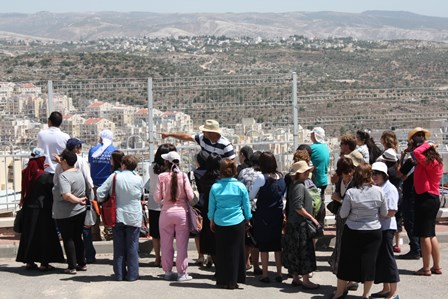Israel: Ultra-Orthodox women become catalysts for peace

Base for Discussion (B4D), Interpeace's peacebuilding initiative in Israel, engages a group that is often overlooked when it comes to issues of peace and conflict: ultra-orthodox women. Despite their influence on the political and spiritual leadership, no efforts have been made to enable female members of the traditional religious community to play an active role in the peace process in their country. A two-year Master's programme specifically tailored to ultra-orthodox women aims to change that.
A two-year Master's programme on conflict resolution
The first group of women is now about to graduate and has been exposed to a wide range of issues concerning the Israeli-Palestinian conflict. "The educational programme empowers women by providing a platform where they can play an active part in the peace process. At the same time, the women learn about different conflict resolution tools, study the scientific literature and familiarize themselves with the historical background of the conflict in the Middle East. Back in their own communities, they then share what they have learned and use the acquired knowledge in the development of nonviolent solutions," explains Noam Shuster, Communications Officer of B4D.
Understanding the different points of view
As part of the programme, a recent two-day tour took the women to the West Bank and the border areas with Syria and Lebanon. Some of the women had never visited areas populated by Palestinians before nor met with Palestinians directly. This entirely new experience and the exposure to members of the Palestinian community increased the understanding for each other's problems and led one of the participants to state that "the only way for our children to have a better future is by making sure our neighbors have the same conditions and equal opportunity for their children."
During the visit, the women also discussed the controversy surrounding the separation barrier that has been set up by Israel. The ultra-orthodox women were able to see the implications that the barrier has for daily life in these regions and this helped them to visualize the theoretical knowledge that they acquired during their classes.
Conflict resolution specialists
After two-years the women are now specialists in the area of conflict resolution especially with regards to the conflict in the Middle East. They do not shy away from meeting members of the Palestinian community and debating solutions with them. Some even plan to launch projects of their own and influence the peace process within their respective communities to make sure that their voices are no longer sidelined.
This initiative is part of "Partnerships for Peace", a joint project with the United Nations Development Programme (UNDP) supported by the European Union (EU).
